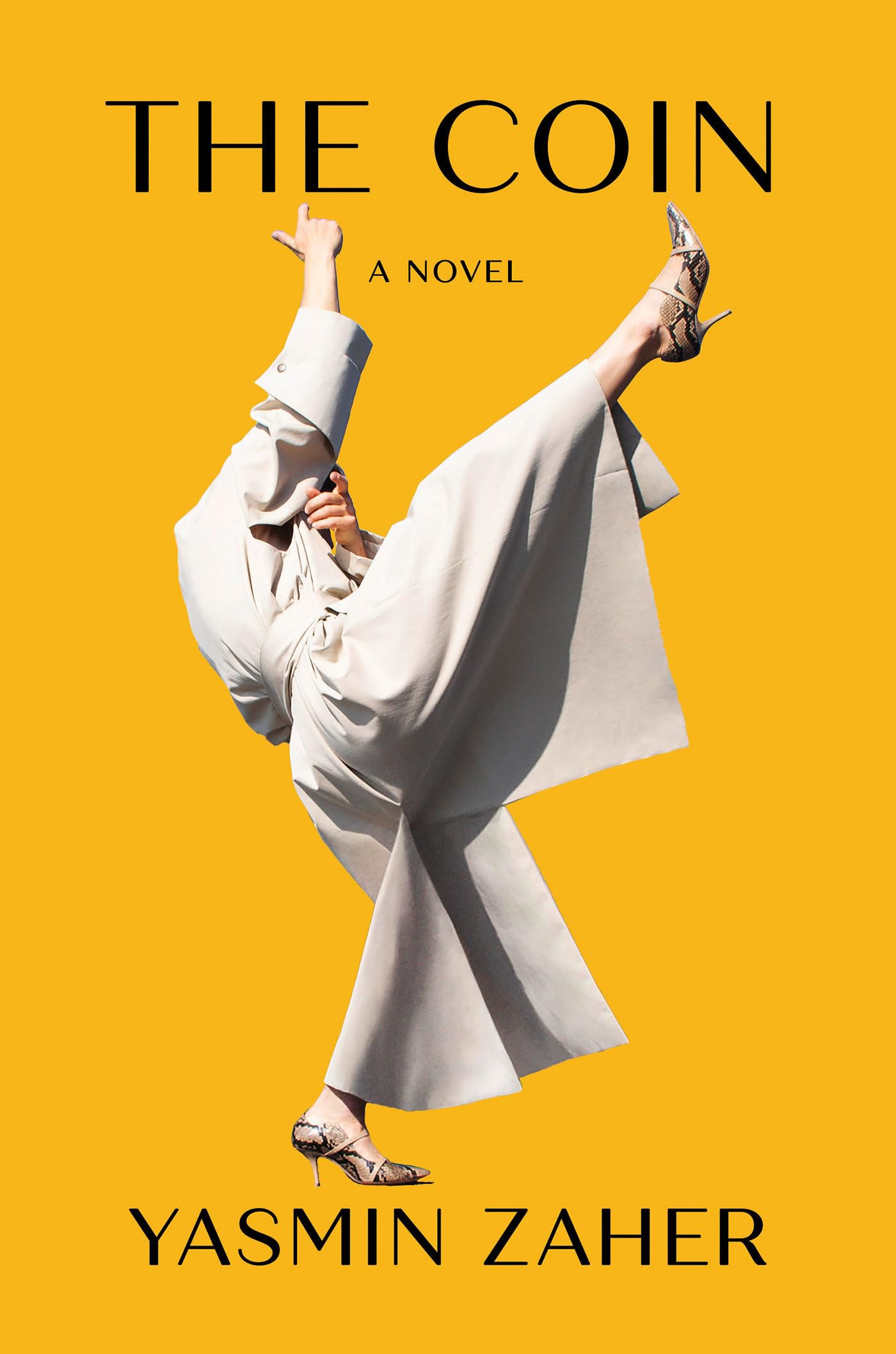Yasmin Zaher
The Coin
The Coin
Couldn't load pickup availability
Winner of the 2025 Dylan Thomas Prize
Sam's Review
I've never understood the appeal of designer handbags—those tiny carriers of lipstick and eyeshadow that cost more than a car. Clearly, and intentionally, they signal that you have the money to buy one. But surely there must be more to their allure than that? In The Coin, the Dylan Thomas Prize-winning debut novel by Yasmin Zaher, the protagonist's Hermès Birkin handbag is far more than an overpriced purse. It is “a portal into another world,” a tool that transforms her into “a woman who others wanted to embody.” And it is this disguise—this reinvention—that unravels over the course of The Coin.
At the start of the novel, the narrator has just moved to America. She's establishing a life in New York, trying to go one better than her deceased parents, who “kept trying and failing to emigrate.” She lives in Brooklyn, near her wealthy boyfriend—“because I wanted to be close to him, not in a dependent way, but in the way it's nice to live near a convenience store.” She teaches at a school where the pupils’ lives “are already hard for them and would likely only get harder.” And she doesn’t need to worry about money, having inherited half of her father’s “twenty-eight million seven hundred and fifty thousand US dollars.” Or at least, the portion her brother—who controls the estate—gives her each month. On the face of it, she is doing well. Almost immediately, though, we’re shown that this may not be true.
Her desire to be clean turns bathing into an afternoon-long ritual, beginning with a lengthy shopping list of tools and lotions from CVS. The narrator explains: “I came from Palestine, which was neither a country nor the third world. It was its own thing, and the women in my family placed a lot of importance on being clean, perhaps because there was little else they could control in their lives.” Perhaps it is just an indulgence that connects her to her roots? Or perhaps not. When she meets two other Palestinian Americans, she deliberately keeps her distance: “I don’t want to be with similar people, I continued, if you rub many knotted strings together, they don’t solve into a beautiful braid, they just become a big ugly mess.”
Instead of seeking common ground in her heritage, the narrator finds it in fashion. She brings Trenchcoat—an incredibly well-dressed, seemingly homeless man—into her apartment as a roommate, laundry manager, and potential lover. Together, they shop in Manhattan’s most expensive stores, dine in its best restaurants, and then head off to Paris as part of a scheme to buy designer handbags and resell them to “the trashy and unworthy.” What begins as an adventure and a challenge—an excuse to visit the fashion houses she loves—becomes the tipping point at which the camouflage she has cloaked herself in falls away, and, potentially, her sanity with it.
The Coin is a strange, intimate, uneasy glamour of a story. The prose is rich in sensory description, but the narrator’s emotions seem cold and unacknowledged. Dirt provokes more feeling than any of her personal relationships. But its disquiet—its ability to keep the reader just off-balance—is its forte. How do immigrants feel when arriving in new countries? How do those from war-torn streets feel when surrounded by the excessive plenty of rampant capitalism? How do we protect ourselves when we don’t know where we belong? A handbag—a portal into another world—may be as good a place as any to start.
Publisher Review
A bold and unabashed novel about a young Palestinian woman's unraveling as she teaches at a New York City middle school, gets caught up in a scheme reselling Birkin bags, and strives to gain control over her body and mind.
The Coin's narrator is a wealthy Palestinian woman with impeccable style and meticulous hygiene. And yet the ideal self, the ideal life, remains just out of reach: her inheritance is inaccessible, her homeland exists only in her memory and her attempt to thrive in America seems doomed from the start.
In New York, she strives to put down roots. She teaches at a school for underprivileged boys, where her eccentric methods cross boundaries. She befriends a homeless swindler, and the two participate in a pyramid scheme reselling Birkin bags.
But America is stifling her - her wilfulness, her sexuality, her principles. In an attempt to regain control, she becomes preoccupied with purity, cleanliness and self-image, all while drawing her students into her obsessions. In an unforgettable denouement, her childhood memories converge with her material and existential statelessness and the narrator unravels spectacularly.
In enthralling, sensory prose, The Coin explores nature and civilisation, beauty and justice, class and belonging - all while resisting easy moralising. Provocative, wry and inviting, The Coin marks the arrival of a major new literary voice.
'A masterpiece' Slavoj Zizek
'A filthy, elegant book' Raven Leilani
'Glamorous and sordid' Elif Batuman
'Chipping away at Western hegemony one scalped it-bag at a time' New York Times
'A brilliant, audacious, powerhouse of a novel ... deliciously unruly' Katie Kitamura
Share


